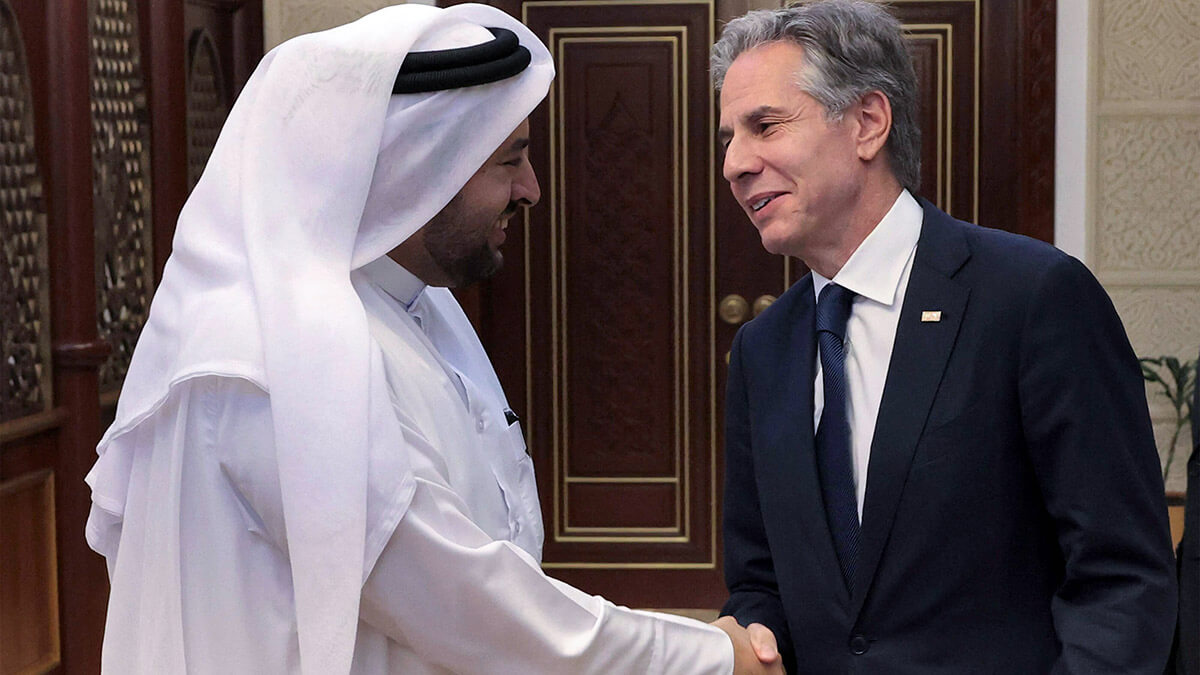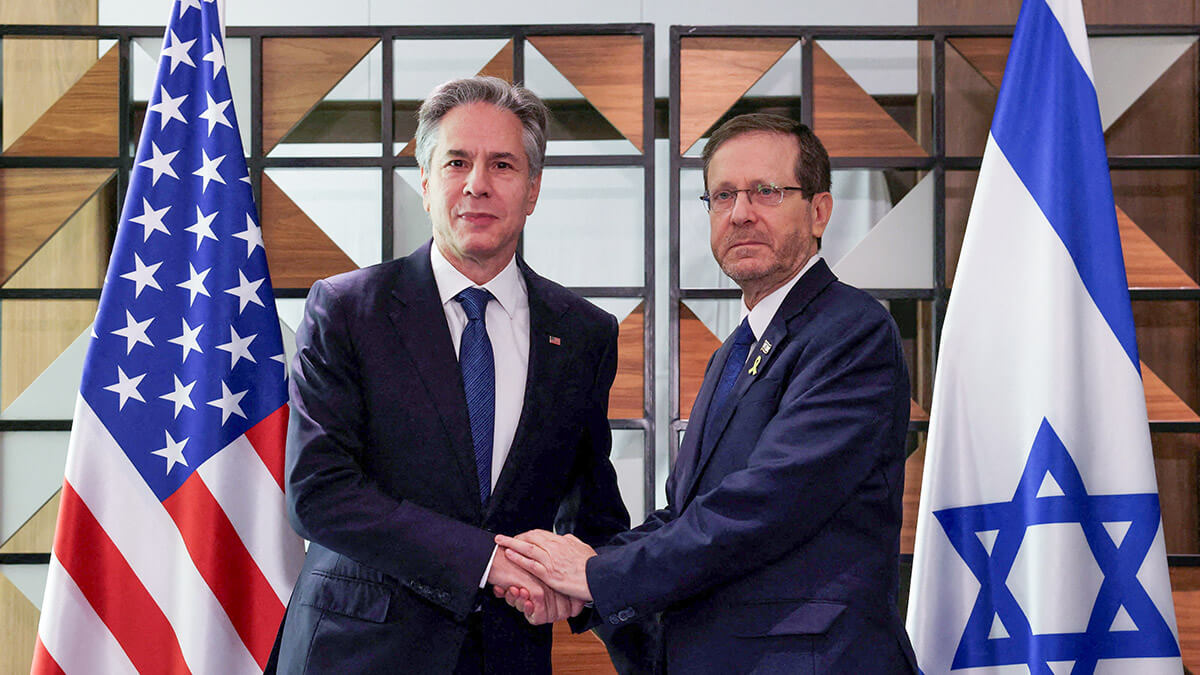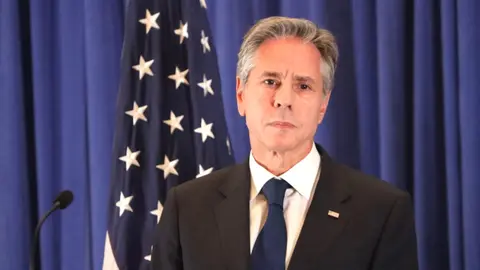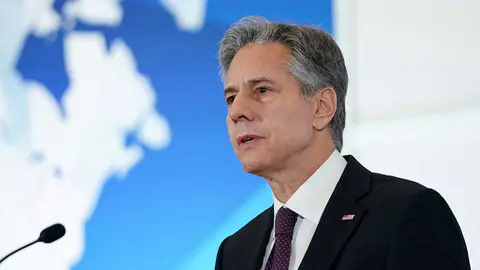Blinken concludes Middle East tour without truce agreement

In an attempt to reach a truce in Gaza, US Secretary of State Antony Blinken has made his ninth visit to the Middle East and proposed a ‘settlement plan’ for a ceasefire in Gaza, which has been accepted by Israel but not by Hamas.
The plan presented by Blinken stipulates a six-week truce accompanied by an Israeli withdrawal from populated areas of Gaza and the release of hostages, and its second phase includes a full Israeli withdrawal from the Strip.
This proposal has been rejected by the Hamas leadership, accusing the US of trying to deceive them and Israel of not honouring its commitments. The organisation has rejected the plan, arguing that it does not provide for the release of Palestinian prisoners and detainees and that it does not guarantee the security of the Palestinian population in the Strip.

Specifically, Hamas said that ‘what was recently presented to the movement constitutes a coup d'état against what the parties reached on 2 July, which is based on Biden's own statement of 31 May and Security Council Resolution No. 2735 (11 June), which is considered a US response and acquiescence to the terrorist Netanyahu's new conditions’.
‘These statements are part of the total US bias towards the Zionist occupation and its full partnership in the aggression and war of extermination against defenceless civilians in the Gaza Strip, and attempts to liquidate our national cause,’ they added.

In the same vein, US President Joe Biden has singled out Hamas for withdrawing from the settlement plan, to which Hamas leaders have responded by denying the accusations. Specifically, Joe Biden declared that Hamas is ‘backing down’.
US State Department regional spokesman Samuel Werberg added: "We are doing everything we can with Egypt and Qatar to end this war. There are big gaps between the two sides of the conflict, and that's why the United States put forward a proposal to close those gaps to achieve a ceasefire, and we are also communicating with Egypt and Qatar to achieve this goal, because we are not known to be in direct contact with the Hamas movement parties, and despite their lack of contact, we have confidence in the Egyptian and Qatari governments.
Before landing in Doha, Blinken had held talks with Israeli and Hamas leaders, as well as with Egyptian and Qatari leaders, to try to persuade them to accept the settlement plan.

Mediation between Egypt, Qatar and the US to achieve a ceasefire in Gaza is a complex and delicate process. Despite the three countries' efforts, Hamas rejected Washington's proposed solution to the problem, accusing Biden of deception, and Blinken called on the movement to accept the latter proposal. This has led to the mediation becoming a source of difficulty for Egypt and Qatar.
The Palestinian movement expressed its desire to end the aggression and called for mediators to force Israel to implement the agreed arrangements. However, Hamas considers Biden and Blinken's statements to be false accusations and do not reflect the movement's true views. This leads to less trust between the parties concerned.
The situation in Gaza is increasingly critical. Despite the efforts of international mediators, including US Secretary of State Antony Blinken, no agreement has been reached to end the violence. Israel's prime minister, Benjamin Netanyahu, appears unwilling to budge and has rejected peace proposals.

The lack of trust between Israel and Hamas is palpable. Netanyahu has reiterated his opposition to any agreement that does not include an Israeli military presence on the Gaza border, which is unacceptable to Hamas. Israeli public opinion is increasingly turning against the war. Most Israelis are calling for a ceasefire to free hostages and to avoid more innocent casualties.
Israel's proposal to maintain a military presence on the Gaza-Egypt border, known as the ‘Philadelphi Corridor’, has provoked controversy among Israeli, Egyptian and Hamas officials. Israel says the area is a major smuggling route for Hamas, while Egypt fears that the presence of Israeli troops will evoke memories of Israel's occupation of Sinai. Israeli Prime Minister Netanyahu has refused to reject a request for a military presence in the Netzarim corridor that separates the Gaza Strip into two areas.
The vision of Egypt and all countries in the region for future stability in the Middle East is based on finding a just and lasting solution to the Palestinian problem. Instead, the lack of progress in negotiations has plunged the region into instability and tension. The situation in Gaza is critical, with thousands of people without access to basic services such as electricity, water and health care, and a large number of refugees and displaced persons.
Netanyahu's reluctance to step down has put him at odds with much of the Israeli public, which is now calling for a ceasefire to free the remaining 105 hostages, and the Israeli military has confirmed that 34 of them have been killed.
Mediators from Qatar, Egypt and the US will meet on Thursday and Friday to resume ceasefire talks. The stakes are very high as the region is on the brink of war due to tensions with the Islamic Republic of Iran and Lebanon.










